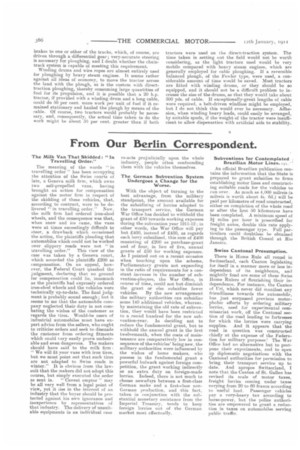From Our Berlin Correspondent.
Page 14

If you've noticed an error in this article please click here to report it so we can fix it.
The Milk Van That Skidded: "In Travelling Order."
The meaning of the words "in travelling order " has been occupying the attention of the Swiss courts of late, a Geneva milk firm, which owns two self-propelled vans, having brought an action for compensation against the motor firm in respect of the skidding of these vehicles, that, according to contract, were to be delivered "in travelling order." Now, the milk firm had ordered iron-shod wheels, and the consequence was that, when snow and ice came, the vans were at times exceedingly difficult to steer, a drawback which occasioned the action, the plaintiffs pleading that automobiles which could not be worked over slippery roads were not "in travelling order." This view of the case was taken by a Geneva court, which accorded the plaintiffs £200 as compensation. On an appeal, however, the Federal Court quashed the judgment, declaring that no ground for compensation could lie, inasmuch as the plaintiffs had expressly ordered iron-shod wheels and the vehicles were technically up-to-date. The final judgment is probably sound enough; but it seems to me that the automobile company neglected their duty in not combating the wishes of the customer as regards the tires. Would-be users of industrial automobiles must have expert advice from the sellers, who ought to criticise orders and seek to dissuade the customer from ordering fitments which could Nery easily prove undesirable and even dangerous. The makers should have said to the milk firm : 'We will fit your vans with iron tires, but we must point out that such tires are not adapted to Swiss roads in winter." It is obvious from the lawsuit that the makers did not adopt this course, but simply executed the order as sent in. " Caveat emptor " may be all very well from a legal point of view, yet it lies in the interest of an industry that the buyer should be protected against his own ignorance and inexperience by representatives of that industry. The delivery of unsuitable equipments in an individual case
re-acts prejudicially upon the whole industry, people often confounding them with the vehicles themselves.
The German Subvention System Undergoes a Change for the Worse.
With the object of turning to the best advantage, from the military standpoint, the amount available for the subsidizing of lorries adapted to the transport service, the German War Office has decided to withhold the grant of £50 towards working expenses during the subvention year 1911-12; in other words, the War Office will pay but £400, instead of £450, as regards each lorry subsidized, this sum of 2400 consisting of £200 as purchase-grant and of four, in lieu of five, annual grants of ..C50 for working expenses. As I pointed out on a recent occasion when touching upon the scheme, Parliamentary grants not expanding in the ratio of requirements for a constant increase in the number of subvention-plaques, the War Office, in course of time, could. not but diminish the grant or else subsidize fewer vehicles. By the new arrangement the military authorities can subsidize some 140 additional vehicles, whereas, by maintaining the old rate of subvention, they would have been restricted to a round hundred for the new subvention-year. In deciding not to reduce the fundamental grant, but to withhold the annual grant in the first twelvemonth, when the costs of maintenance are comparatively low in consequence of the vehicles' being new, the military authorities were influenced by the wishes of home makers, who possess in the fundamental grant a powerful bulwark against foreign competition, the grant working indirectly as an extra duty on foreign-made lorries. Indeed, there is not much to choose nowadays between a first-class German make and a first-class nonGerman production, and this fact, taken in conjunction with the substantial monetary assistance from the Imperial Treasury, tends to keep foreign lorries out of the German market most effectually. Subventions for Contemplated . Brazilian Motor Lines. ere, ' An official Brazilian publication contains the information that the State is prepared to grant subsidies to firms establishing motor lines and constructing suitable roads for the vehicles to run over. As much as 4,000 mikeis (a milreis is worth about 4s. fid.) will be paid per kilometre of road constructed, either on completion of the whole road or after the first 50 kilometres have been completed. A minimum speed of n miles per hour is prescribed for freight autos, double this rate applying to the passenger type. Full particulars could doubtless be obtained through the British Consul at Rio Janeiro.
Swiss Cantonal Presumption.
There is Home Rule all round in Switzerland, each Canton legislating for itself in a manner more or less independent of its neighbours, and mightily fond are some of these Swiss Home Rulers of flourishing their independence. For instance, the Canton of Uri, which never did manifest any friendliness towards the automobile, has just surpassed previous motorphobic efforts by ordering military lorries, used for experimental commissariat work, off the Cantonal section of the road leading to fortresses for which the lorries were carrying supplies. And it appears that the road in question was constructed chiefly at the expense of the Federation for military purposes ! The War Office had no alternative but to postpone their experiments, and to open up diplomatic negotiations with the Cantonal authorities for permission to bring their transport service up to date. And apropos Switzerland, I note that the Canton of St. Gallen has revised its scale of motor taxes, freight lorries coming under taxes varying from 20 to 60 francs according to useful load. Passenger vehicles pay a very-heavy tax according to horse-power, but the police authorities are empowered to grant a reduction in taxes on automobiles serving public traffic.




















